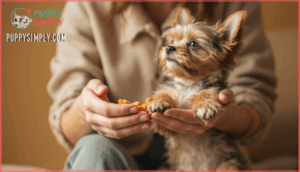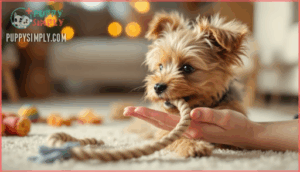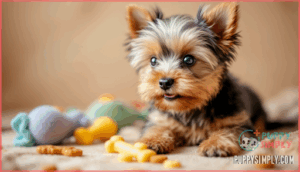This site is supported by our readers. We may earn a commission, at no cost to you, if you purchase through links.

The good news is that you can speed up this process considerably with the right training approach—teaching your pup what’s acceptable to chew on and what isn’t. With consistent boundaries and a few strategic techniques, you’ll transform those sharp nips into gentle play faster than you might expect.
Table Of Contents
- Key Takeaways
- Reasons for Yorkie Biting
- Training Methods to Stop Biting
- Establishing Boundaries
- When Will Biting Stop?
- Stopping Biting in Puppies
- Stopping Biting in Older Dogs
- Patience and Consistency Are Key
- Frequently Asked Questions (FAQs)
- Can a Yorkie’s biting behavior be a result of separation anxiety?
- How can I prevent my Yorkie from biting other dogs during walks or playtime?
- What age do Yorkies typically stop biting?
- Can medication help with aggressive biting behavior?
- Are there specific toys best for teething?
- How do I introduce my Yorkie to strangers?
- Should I use a muzzle during training sessions?
- Conclusion
Key Takeaways
- Most Yorkie puppies naturally stop biting between four and six months when adult teeth come in, but consistent training can speed up this process significantly and reduce problematic biting by 70% before 10 months.
- Puppy biting stems from four main causes—teething discomfort, fear and anxiety, attention-seeking behavior, or past mistreatment—and identifying the root cause helps you address it with the right combination of exercise, distraction, and bite inhibition training.
- The "ouch and walk away" method mimics natural littermate feedback by immediately ending play when biting occurs, teaching your Yorkie that rough behavior loses them your attention and companionship.
- Patience and household-wide consistency matter more than quick fixes—positive reinforcement through treats and praise for calm behavior works better than punishment, with 85% of Yorkies stopping habitual biting by their first birthday when owners stay the course.
Reasons for Yorkie Biting
If your Yorkie puppy keeps nipping at your hands or ankles, you’re not dealing with aggression—you’re dealing with normal puppy behavior that has a cause. Understanding why your Yorkie bites is the first step toward stopping it.
Let’s look at the four main reasons behind this behavior.
Teething
Teething transforms your sweet Yorkie into a tiny piranha on a mission to gnaw everything in sight. Between 3 and 8 months old, tooth eruption causes serious discomfort, and your Yorkie puppy uses biting to ease that teething pain.
Between 3 and 8 months, teething turns your Yorkie into a tiny piranha that bites everything to soothe aching gums
Frozen chew toys work wonders for gum soothing—they numb the ache while satisfying those relentless chewing instincts. Offer different textures to see what clicks, and you’ll help your pup through this phase without sacrificing your fingers.
Fear and Anxiety
Sometimes the biting isn’t about teething at all—it’s rooted in fear and anxiety. Yorkies are especially prone to these feelings, and when your puppy feels threatened or overwhelmed, defensive biting becomes their go-to response. Noise phobia from thunderstorms or fireworks, environmental stress from new places, or separation anxiety can all trigger fear responses that lead to nipping.
Addressing fear and anxiety early matters because roughly three-quarters of pet dogs show anxiety-related issues, and toy breeds like yours are hit hardest. Managing puppy anxiety means identifying those anxiety triggers and using calming techniques to build confidence:
- Pheromone diffusers create a sense of safety in your home
- Gradual desensitization to scary sounds and situations reduces canine anxiety over time
- Mental exercise and predictable routines help your Yorkie feel secure and less reactive
Understanding separation anxiety issues is essential for developing effective strategies. Teach bite inhibition while you work through these challenges, and you’ll see real progress.
Attention Seeking
While fear can make your Yorkie defensive, sometimes those little nips are just a ploy for your undivided attention. Your Yorkie puppy quickly learns that puppy biting gets immediate reactions—whether you’re scolding, laughing, or engaging. This creates a cycle where attention-seeking behaviors get reinforced, even when the attention is negative.
| Attention Signal | What Your Yorkie Wants | Your Response |
|---|---|---|
| Nipping at ankles | Playtime or walk | Redirect to toy, then play |
| Mouthing hands | Physical affection | Ignore biting, reward calm behavior |
| Tugging clothes | Food or treats | Address need satisfaction without rewarding nips |
| Jumping and biting | Social interaction | Turn away until settled |
| Persistent nibbling | Relief from boredom | Provide mental stimulation |
Teaching bite inhibition through positive reinforcement helps your Yorkie understand that calm behavior—not nipping—earns social rewards and meets their emotional needs during playful interactions.
Mistreatment
On the flip side, a Yorkie that’s been mishandled or mistreated may bite not for attention, but out of genuine fear and self-protection. Harsh discipline, neglect signs, or emotional scars from past abuse create lasting trauma that triggers defensive Yorkie puppy biting.
Addressing behavioral issues in dogs requires patience during trauma recovery—teaching bite inhibition and puppy behavior modification while prioritizing abuse prevention through gentle, consistent management.
Training Methods to Stop Biting
Training your Yorkie puppy requires a hands-on approach that tackles their natural instincts while teaching them what’s acceptable.
The methods below work together to redirect that mouthy energy into positive behaviors. Let’s look at four proven techniques that’ll help you curb those nips and bites.
Exercise Your Puppy
A tired puppy is a well-behaved puppy—when your Yorkie’s got energy to burn, those sharp little teeth are more likely to find their way to your hands and furniture. Daily puppy exercise is your secret weapon against teething chaos.
Here’s how to make it work:
- Build a playtime routine that includes 20-30 minutes of outdoor activities like walks, fetch, or chase games—enough to achieve energy exhaustion without overworking their tiny legs, making puppy training sessions afterward far more effective.
Hand-Train Your Puppy
Your puppy’s paws, ears, and belly aren’t just adorable—they’re also areas that can trigger defensive nipping if your Yorkie isn’t comfortable with your touch.
Hand-train your puppy by gently touching these sensitive spots while offering treats and praise. Start with brief sessions—just a few seconds—then gradually extend the time as your Yorkie puppy relaxes.
This puppy socialization builds trust through positive reinforcement, teaching your little one that gentle touch means good things, not threats. Use hand signals and calm puppy communication to reinforce these training techniques, making bite inhibition easier down the road.
Distract Your Puppy
When those tiny teeth start sinking in, the smartest move you can make is to swap yourself out for something way more interesting. Keep chew toy alternatives within arm’s reach—think rope toys, rubber teethers, or frozen washcloths for teething relief.
The moment your Yorkie puppy goes for your hand, calmly redirect their attention to the toy. This isn’t just distraction—it’s teaching gentle play through positive reinforcement, showing your pup what’s okay to bite while you stay calm and consistent.
Teach Bite Inhibition
Bite inhibition training is one of the most critical lessons your Yorkie puppy will ever learn—it’s basically teaching jaw control so that gentle mouth behavior becomes second nature. Puppies raised with littermates naturally learn this through puppy socialization, as other pups yelp and walk away after hard bites.
Start by allowing soft biting during play, but the instant pressure increases, let out a high-pitched ‘ouch!’ and immediately stop all interaction. Consistency is everything here; repeat these bite inhibition techniques every single time teeth apply too much pressure, and you’ll see progress within weeks as your pup masters soft biting. Understanding error resolution steps can help in addressing similar training issues.
Establishing Boundaries
Teaching your Yorkie when enough is enough isn’t about punishment—it’s about clear communication. Your puppy needs to understand that biting ends playtime, not extends it.
Here’s how to set those non-negotiable lines in a way your pup actually understands.
Say Ouch! And Walk Away
One sharp nip from those needle-like puppy teeth is all it takes to realize you need a game plan that speaks your Yorkie’s language. When your Yorkie puppy bites, mimic their pain response—let out a high-pitched "Ouch!" and immediately walk away. This boundary setting technique teaches bite inhibition by showing that rough play ends all fun. Your calm demeanor during this process matters more than you’d think.
Here’s how to make it work:
- Give a sharp "Ouch!" the moment teeth touch skin—timing is everything
- Stand up and turn your back, redirecting attention away from play
- Leave the room for 30 seconds to drive the point home
- Return with a gentle touch approach, rewarding calm puppy behavior
- Repeat consistently so your Yorkie connects biting with losing your company
This isn’t punishment—it’s communication your puppy already understands from littermate play.
Positive Reinforcement
The trick to stopping biting isn’t just teaching your Yorkie what not to do—it’s showing them what earns the good stuff. Reward training builds positive associations fast. When your puppy keeps their mouth off your hands, mark that moment with gentle commands like "good" or use the clicker method, then follow with calm rewards. This positive reinforcement strengthens bite inhibition while teaching puppy behavior you actually want.
Here’s your training technique blueprint:
- Catch calm moments—the second your Yorkie approaches without nipping, deliver positive praise and a small treat to reinforce that restraint pays off better than roughhousing ever could.
When Will Biting Stop?
Most puppies show a real drop in biting between 8 and 10 months—right when teething wraps up and your training starts clicking. But timing isn’t one-size-fits-all. Here’s what actually shapes when your Yorkie stops biting:
- Puppy development peaks around 12 to 13 weeks when baby teeth shift to adult teeth
- Teething timeline ends by 7 months, which naturally reduces chewing urges
- Bite inhibition training before 6 months cuts biting by 70% by 10 months
- Consistent positive reinforcement speeds up biting cessation by 60% compared to no training
- Redirecting to chew toys helps puppies stop biting hands 2 months earlier
- Fear or anxiety from rough treatment can extend the biting phase by months
- Lack of exercise prolongs biting behaviors 35% longer past the 8-month mark
- Most Yorkie puppies stop habitual biting by their first birthday with proper guidance
- Biting past 12 months signals you need professional help
Bottom line? With steady training, 85% of Yorkies quit problematic biting within their first year.
Stopping Biting in Puppies
Training a puppy takes action, not just hope—so let’s walk through the methods that actually work. Start with positive reinforcement—reward your Yorkie puppy every time they play without biting. Hand them chew toy alternatives when they nip, redirecting that teething energy onto something safe.
Puppy socialization matters too; exposing your pup to other dogs teaches bite inhibition naturally. They’ll learn how hard is too hard through gentle play sessions.
Stopping Yorkie puppy biting means catching it early—puppies under six months respond fastest. Keep treats handy, stay consistent, and remember that biting prevention works best when you’re patient. Your pup isn’t trying to hurt you; they’re learning how their mouth works.
Stopping Biting in Older Dogs
If your Yorkie’s still nipping past puppyhood, you’re dealing with a habit that needs firmer intervention. Older Dog Training requires clear boundaries—everyone in your household must enforce the same rules, or your adult Yorkie won’t understand what’s expected. Behavior Modification techniques like Positive Reinforcement help redirect aggression, while desensitization training eases anxiety triggers.
Stopping Yorkie Puppy Biting works differently in older dogs—Biting Prevention takes patience, but Dog Training Techniques customized to adults can break even stubborn patterns.
For Adult Yorkie Care, consider these steps:
- Muzzle training for severe cases during Bite Inhibition Training
- Calming supplements if stress fuels the biting
- Counterconditioning to replace bad habits with positive associations
- Professional guidance for Senior Dog Management
Patience and Consistency Are Key
Breaking a biting habit isn’t a quick fix—it’s built on repetition and refusing to let frustration derail your progress. Gentle Training paired with Consistent Rewards teaches your Yorkie puppy what’s acceptable without confusion. Positive reinforcement—treats, praise, calm affection—beats punishment every time. Patient Owners create a Calm Environment where consistent training actually sticks, especially during teething when biting peaks.
| What Works | What Doesn’t |
|---|---|
| Gentle Training with rewards | Yelling or physical punishment |
| Calm Environment for learning | Inconsistent household rules |
| Positive Reinforcement daily | Giving up after one week |
| Consistent Rewards for good behavior | Rough play that encourages biting |
| Patient Owners who stay the course | Expecting overnight results |
Keep at it—your Yorkie will learn.
Frequently Asked Questions (FAQs)
Can a Yorkie’s biting behavior be a result of separation anxiety?
Yes, separation anxiety can trigger biting in your Yorkie puppy. Watch for patterns—does the biting happen when you’re preparing to leave or returning home? Destructive behavior, excessive barking, and anxious nipping often signal separation stress.
Behavioral therapy and calming techniques can help address these anxiety triggers alongside proper puppy socialization.
How can I prevent my Yorkie from biting other dogs during walks or playtime?
Studies show that nearly 40% of dog-on-dog aggression stems from poor early socialization techniques.
During walks or playtime, redirect your Yorkie puppy’s attention before biting happens—use high-value treats and engaging toys to reinforce positive reinforcement and proper canine communication.
Practice bite inhibition through supervised puppy socialization sessions, teaching leash training fundamentals and playtime etiquette.
At the dog park, safety means watching body language closely and intervening early, helping your Yorkie learn appropriate boundaries with other dogs.
What age do Yorkies typically stop biting?
Most Yorkie puppies naturally stop biting between four and six months of age, once teething wraps up and they’ve learned bite inhibition through consistent training.
Puppy development plays a huge role—canine maturity brings better self-control and understanding of boundaries.
Can medication help with aggressive biting behavior?
In severe cases, anxiety treatment or calming aids can support behavior modification for your Yorkie puppy.
Behavioral supplements or medication options should only be considered after consulting your vet, who’ll assess whether aggression therapy is needed alongside bite inhibition training for your biting canine behavior issues.
Are there specific toys best for teething?
Imagine your Yorkie’s gums feeling like they’re on fire—that’s teething. Rubber toys and frozen treats work best because they’re durable and soothe inflamed gums.
Look for puppy-safe chew toys designed specifically for teething to redirect biting while teaching bite inhibition naturally.
How do I introduce my Yorkie to strangers?
Start with controlled exposure. Let your puppy observe strangers from a safe distance, rewarding calm behavior.
Gradually decrease the distance as your Yorkie puppy socialization progresses. Use calming techniques and gentle introduction methods during public encounters, ensuring positive experiences build confidence and prevent stranger danger reactions.
Should I use a muzzle during training sessions?
About 80% of puppy biting cases never need a muzzle—positive reinforcement and bite inhibition work best.
Only use muzzles for severe biting if a professional recommends it, not during regular training sessions with your Yorkie puppy.
Conclusion
Wondering when Yorkie puppies stop biting and how you can stop it? The answer lies in your hands more than the calendar. While most Yorkies naturally ease up around six months, your commitment to consistent training determines whether you’ll see results in weeks or months.
Remember that every correction, every redirected nip, and every patient boundary you set builds the foundation for a well-mannered companion. Stay the course—your efforts today shape the gentle dog your Yorkie will become tomorrow.
- https://www.akc.org/expert-advice/health/puppy-teething-pain-toy/
- https://www.nature.com/articles/s41598-020-59837-z
- https://pmc.ncbi.nlm.nih.gov/articles/PMC7058607/
- https://www.yorkieinfocenter.com/yorkie-separation-anxiety
- https://www.cambridge.org/core/journals/animal-welfare/article/fearmotivated-aggression-in-dogs-patient-characteristics-diagnosis-and-therapy/3FE78828E3ABA909649CBA32674A3F3C















